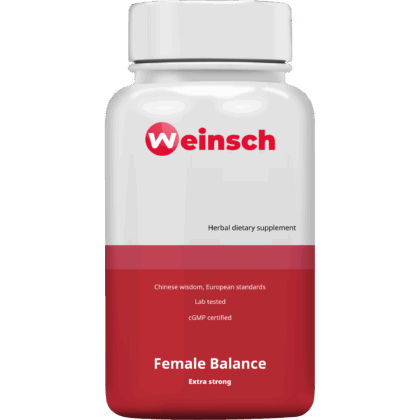Wu Zhu Yu (fruit d'Evodia) est une plante chaude, âcre et légèrement amère de la médecine traditionnelle chinoise (MTC), connue pour réchauffer l'intérieur, disperser le froid, diriger le Qi rebelle vers le bas et soulager la douleur. Elle est particulièrement efficace dans les troubles digestifs liés au froid, le froid dans le canal du foie et les maux de tête ou les vomissements causés par le froid interne. Malgré son caractère fortement réchauffant, il joue également un rôle dans l'apaisement du Qi rebelle et le soulagement des nausées.
Wu Zhu Yu est souvent utilisé dans les formules pour les douleurs herniaires, les reflux acides, les migraines de type froid et les crampes menstruelles, en particulier chez les patients de constitution froide.
Fonctions et avantages
Réchauffe le Jiao moyen et soulage la douleur
- Traite le rhume de l'estomac et de la rate avec des symptômes tels que des douleurs épigastriques, des nausées et des diarrhées.
- Utilisé en cas de gastrite chronique ou de mauvaise digestion due au froid.
- Renforce le Yang dans le tube digestif et améliore l'appétit
Redirige le Qi rebelle vers le bas et arrête les vomissements
- Particulièrement utile en cas de vomissements ou de hoquets dus à un refroidissement de l'estomac ou du foie.
- Traite les reflux acides et les éructations causés par l'inversion du Qi induite par le froid.
- Soulage les nausées en cas de faiblesse digestive aiguë ou chronique
Réchauffe le canal du foie et soulage la douleur
- Traite les douleurs herniaires liées au froid, les douleurs testiculaires ou les crampes menstruelles.
- Traite le froid du canal du foie provoquant des douleurs dans le bas-ventre ou la région inguinale.
L'incendie se propage vers le bas
- Paradoxalement utilisé pour les plaies de la bouche et de la langue causées par la chaleur ascendante.
- Sa forte action descendante aide à ramener le feu du foie rebelle vers le bas.
Indications (qui peut en bénéficier ?)
Les personnes souffrant de nausées, de vomissements ou de reflux gastriques dus au froid.
Les personnes souffrant de douleurs épigastriques ou abdominales dues au froid
Les femmes souffrant de dysménorrhée ou de troubles menstruels dus au froid interne.
Les patients souffrant d'une hernie ou d'une douleur testiculaire due au froid hépatique.
Les personnes souffrant de maux de tête dus au froid ou de migraines, en particulier après une exposition au vent ou au froid.
Diagnostic de la langue et du pouls en MTC
Langue : Pâle avec un revêtement blanc et humide (indiquant le froid)
Pouls : profond, lent ou filandreux (froid ou contrainte du Qi du foie)
Modèles apparentés de la MTC
Froid de l'estomac avec Qi rebelle - Nausées, vomissements, éructations, douleurs épigastriques
Froid dans le canal du foie - Hernie, douleurs testiculaires, crampes menstruelles
Froid du Jiao moyen - Diarrhée, manque d'appétit, ballonnement abdominal
Feu du foie - Plaies buccales ou rougeur du visage avec froid sous-jacent dans le bas du corps
Maux de tête dus au froid - Maux de tête au niveau du vertex ou de l'occiput aggravés par le vent ou le froid
Applications cliniques (pour référence uniquement)
Reflux acide et vomissements chroniques - Réchauffe et dirige le Qi rebelle vers le bas
Dysménorrhée due au froid - Soulage les douleurs menstruelles causées par le froid interne
Douleur herniaire - Traite la douleur abdominale basse et testiculaire due au froid hépatique.
Migraine et maux de tête - En particulier douleur de type froid ou vertex avec nausées
Diarrhée chronique - Renforce la digestion et résout l'humidité froide dans les intestins.
Formules courantes à base de plantes avec Wu Zhu Yu
- Wu Zhu Yu Tang - Pour les vomissements froids, les reflux acides et les maux de tête froids.
- Wen Dan Tang (modifié) - Pour le Qi rebelle dû au froid dans l'estomac et la vésicule biliaire.
- Tian Tai Wu Yao San - Pour les hernies et les douleurs testiculaires dues au froid du foie
- Wen Jing Tang - En cas de refroidissement de l'utérus et d'irrégularités menstruelles
- Sheng Hua Tang - Pour les douleurs post-partum et la stase sanguine avec le froid
Précautions et contre-indications
Contre-indiqué en cas de chaleur, de déficience du Yin ou de constitutions sèches.
A éviter chez les patients présentant une langue rouge, une soif ou une sécheresse buccale sans signes de froid.
A utiliser avec précaution pendant la grossesse en raison de la forte chaleur et de la nature mouvante.
Peut provoquer une légère sensation de brûlure dans la gorge - à consommer de préférence avec du gingembre ou du miel.
Recommandations en matière de mode de vie et d'alimentation
✔ Manger des aliments qui réchauffent comme le gingembre, le fenouil, la cannelle et les bouillons chauds.
✔ Éviter les aliments crus, froids ou gras qui affaiblissent la digestion et favorisent la rétention du froid.
✔ Maintenir l'abdomen et le bas du corps au chaud, surtout en hiver ou après les repas.
Incorporer un massage abdominal doux ou la moxibustion pour les schémas de froid chronique.
Conclusion
Le Wu Zhu Yu (fruit d'Evodia) est une plante chauffante puissante qui réoriente le Qi rebelle, soulage les douleurs dues au froid et renforce les brûleurs moyens et inférieurs. Elle est particulièrement utile en cas de troubles digestifs, de crampes menstruelles et de maux de tête dus au froid, notamment chez les patients présentant une déficience en Yang ou une constitution froide. Bien que de nature forte, c'est une plante clé pour restaurer la chaleur, la direction et le confort du corps.

